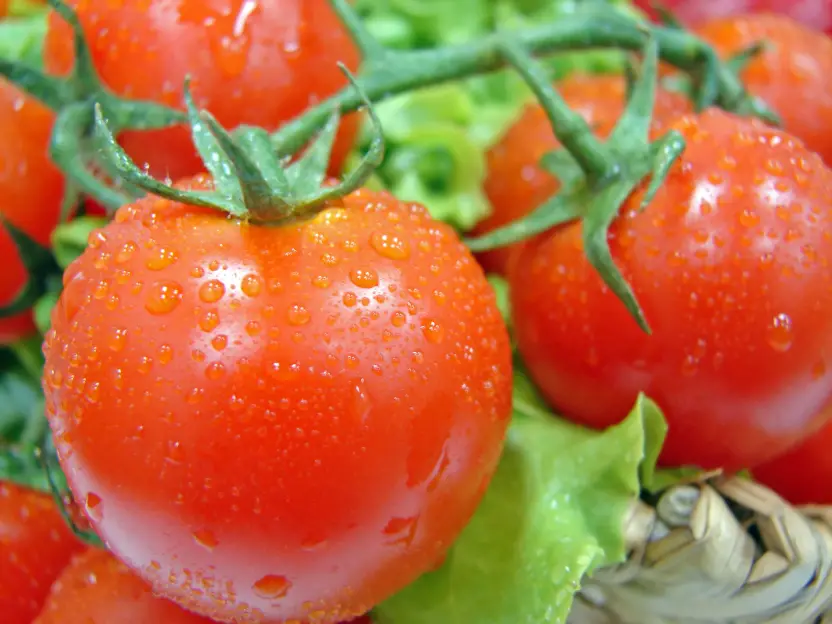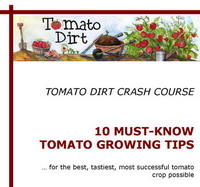FREE: 10 Must-Know Tomato Growing Tips Get The Guide
Read our affiliate disclosure here.
Should I Freeze or Can My Tomatoes? Pros and Cons of Each
Since 2010, Tomato Dirt has garnered 4.8+ million views, making it the web’s leading online source for growing tomatoes in the home garden. Award-winning writer and Tomato Dirt owner Kathy Widenhouse has helped thousands of home gardeners grow healthier tomatoes. Be one of them when you get Tomato Dirt’s Growing Guide here.
Updated 8.5.24
Should you freeze or can your tomatoes?
The easy answer is yes. Both methods for preserving tomatoes have advantages.
Nothing can take the place of a fresh tomato. But if you have large quantities to preserve for the winter, what should you do with them?
Freeze or can? To be honest, it's nice to have both. You can accumulate enough frozen tomatoes and then can whatever else you harvest in a season, or vice versa.
Check out the dirt on the pros and cons of each method and decide for yourself.
(And let us know your preference by posting your comment below. Thanks!)
Freezing tomatoes: advantages and disadvantages
Advantages of freezing tomatoes
- Freezing tomatoes is the easiest way to preserve them. It’s convenient.
- It’s fast. You don’t need to cook them. You can wash tomatoes, remove their stems, pop them in a freezer bag, and be done.
- Frozen tomatoes work well in recipes (sauces, casseroles, soups, stews, and chili for instance). For recipes where you’re going to cook tomatoes anyway, freezing them makes sense.
- Small quantities work. You can freeze a few containers of tomatoes as they ripen and avoid heating up the entire kitchen. (Canning requires large amounts to be worth your time and to fill jars.) This is especially helpful if you grow indeterminate tomatoes, which ripen throughout the season and not all at once like determinates.)
Disadvantages to freezing tomatoes
- Tomatoes lose their texture when thawed and get mushy. Freezing breaks down the pulp fibers (they contain water) and expands them when they freeze. The result is soft and watery.
- Freezing tomatoes reduces their flavor. Enzymes responsible for a tomato’s taste are rendered inactive below 50ºF.
- Thawed tomatoes are not appealing to eat by themselves … especially when it comes to texture. (They’re great to have for cooking, but not so great to just eat straight.)
- Frozen tomatoes take up a lot of valuable freezer space. Depending on what you might need to use that real estate for, canning might be the way to go. You can also “temporarily” freeze tomatoes whole when you harvest them, and then when the rush of the harvest season is over a month or two later, pull out the tomatoes, slip off their skins under hot water, and run them through a hot water bath canner
or a pressure canner
.
Slicing varieties (and other types of tomatoes with the most juice) lose considerable liquid when frozen and leave little pulp behind. You can offset this disadvantage by freezing several different types of tomatoes together. Or cut them in half and discard part of the liquid and seeds before freezing. You can also freeze juicy tomatoes and when thawing, simply reserve the excess liquid to use as a base for soup stock.
Canning tomatoes: advantages and disadvantages
Advantages of canning tomatoes
- Aficionados argue that you can preserve more fresh tomato flavor with canned tomatoes (over freezing them.)
- Canning tomatoes is an especially useful route to take when you have large quantities to process at one time, as in when your determinate tomato crop comes in!
- Canned tomatoes have a texture similar to commercially-produced canned tomatoes and are often eaten directly as a side dish, rather than being used solely for cooking.
- Tomatoes are one of the easiest types of produce to can safely.
- You won’t lose canned tomatoes in a power outage as you might with frozen tomatoes when a freezer’s power is cut off.
- Canned tomatoes save on precious freezer space.
Disadvantages to canning tomatoes
- It takes more time and work to can tomatoes than to freeze them.
- You need a hot water bath canner
or a pressure canner
, along with canning jars and lids, to can tomatoes. However, you can use a canner for preserving a whole host of other vegetables, fruits, and (if you get a pressure canner) even meats.
- You may heat up your kitchen when canning which can be especially uncomfortable in the summer months.
More on preserving tomatoes
Freezing tomatoes: what you need to know to get started ...
Freezing tomatoes FAQs: frequently asked questions ...
Freezing Cherry Tomatoes: what you need to know ...
Canning tomatoes: the basics you know to get started ...
Canning tomatoes FAQs: frequently asked questions ...
Tomato canners: which to use for canning tomatoes ...
Preserving tomatoes: should I can, dry, or freeze them?
How to Store Tomatoes: A Gardener’s Guide ...
How to Store Sliced Tomatoes ...
Get more tips for canning tomatoes and freezing tomatoes on our Pinterest board.
Return from Should I Freeze or Can My Tomatoes? to Tomato Dirt home
As an Amazon Associate and Rakuten Advertising affiliate I earn from qualifying purchases.
SHARE THIS PAGE:




New! Comments
Have your say about what you just read! Leave a comment in the box below.